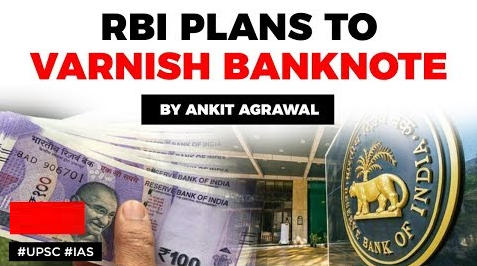Table of Contents


IN NEWS
- In its annual report of 2018-19 released, the RBI mentioned the introduction of varnished currency notes of Rs 100 denomination on a field trial basis.
- In its 2017-18 annual report, the RBI had stated that it was exploring the feasibility of increasing the life of Indian banknotes.
WHAT IS THE ISSUE?
- Already RBI occurs expenditure on junked currency or withdrawal of old series of notes.
- With this, soiled currency notes is a big issue for the RBI
- It disposes of crores of soiled banknotes every year, which must then be replaced with new notes.
- According to the report, the RBI withdrew1,636 crore pieces of soiled bank notes in 2015-16, 1,250 crore pieces in 2016-17, 2,767 crore pieces last fiscal.

SOILED, MUTILATED AND IMPERFECT BANKNOTES
- Soiled note means a note which, has become dirty due to usage and also includes a two piece note pasted together.
- Mutilated banknote is a banknote, of which a portion is missing or which is composed of more than two pieces.
- Imperfect banknote means any banknote, which is wholly or partially, shrunk, washed, altered or indecipherable but does not include a mutilated banknote
- The RBI said that it incurred an expenditure of ₹4,811 crore on security printing during July 1, 2018 to June 30, 2019 as compared to ₹4,912 crore in the previous year.
SO WHAT RBI IS DOING?
- The RBI is now planning to conduct a field trial of varnished currency notes to improve their durability and life.
- Now, in consultation with the Government of India, the Reserve Bank of India has been exploring the feasibility of increasing the life of Indian banknotes.
WHAT IS VARNISH?
- Varnish is a clear transparent hard protective finish or film.
- Varnish has little or no color and has no added pigment.
- Varnish finishes are usually glossy.
VARNISHED NOTES VS PLASTIC NOTES
- Varnished & Plastic notes, both are different.
- Plastic notes are cleaner & lighter in comparison to the paper notes.
- Plastic notes were introduced for the first time in Australia in 1988.
BENEFITS OF VARNISHED NOTES
- International experience suggests that varnishing of banknotes is expected to
- Increase their life and durability, reduce banknote replacement requirements
- Thereby, lower the overall printing expenditure,”
- The RBI said in its Annual Report 2017-18
- It also enhances the security features.
PLANS FOR CURRENCY NOTES
- The proposal to introduced varnished Rs 100 notes is part of several interesting plans the RBI has for currency notes. •
- For example, the RBI is looking at making currency notes more visually-impaired friendly.
- Also enhancing the security features of bank notes to counterfeit fake currencies.
QUALITY ASSURANCE LABORATORY
- To achieve the above objective, RBI has set up a state-of the art Banknote Quality Assurance Laboratory in Mumbai With the aim of upgrading and standardising currency notes.
- The laboratory will focus on standardising the quality of banknotes between all the different security presses that print currency notes.
PRINTING FACILITIES IN INDIA
- Section 22 of the RBI Act 1934, gives the RBI the authority to issue currency notes.
- The Reserve Bank of India has printing facilities in Dewas, Mysore, and Salboni.
COINS
- GOI directly handles the minting of coins.
- Coins are minted at the four mints:
- Alipore in Kolkata, Saifabad in Hyderabad, Cherlapally in Hyderabad, and Noida in Uttar Pradesh.
- Although the government handles minting coins, the Reserve Bank issues them for circulation.

Latest Burning Issues | Free PDF






















 WhatsApp
WhatsApp